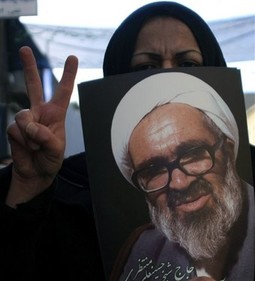Had it Been Montazeri
Obviously, what ifs and if onlys do us little good now, but it's hard not to wonder what the Islamic Republic of Iran would look like today had Montazeri remained Ayatollah Khomeini's chosen successor. It's tough to tell, but it's not unreasonable to believe that the regime would be a freer one, a more liberal one and a more globally engaged one.

Reporting from Beirut on the funeral of Iranian cleric Hossein Ali Montazeri, Robert Worth writes:
In the years after the revolution, Ayatollah Montazeri served as the Friday Prayer leader in Qum and as a deputy to Ayatollah Khomeini, who designated him as his successor in 1985. Although he lacked a large popular following, the senior ayatollah viewed him as a loyal supporter of the concept of clerical rule.But Ayatollah Montazeri gradually began to move away from his mentor’s policies. In 1989, after a mass execution of political prisoners, he published an article condemning the decision and calling for a “political and ideological reconstruction.” He also mocked Ayatollah Khomeini’s fatwa calling for the killing of the novelist Salman Rushdie, saying, “People in the world are getting the idea that our business in Iran is just murdering people.”
Ayatollah Khomeini quickly denounced Ayatollah Montazeri, who was stripped of his post. The state news media no longer called him a grand ayatollah and instead began to refer to him dismissively as a “simple-minded” cleric. In 1997, he was placed under house arrest after criticizing Ayatollah Khomeini’s successor as supreme leader, Ayatollah Khamenei.
Obviously, what ifs and if onlys do us little good now, but it's hard not to wonder what the Islamic Republic of Iran would look like today had Montazeri remained Ayatollah Khomeini's chosen successor. It's tough to tell, but it's not unreasonable to believe that the regime would be a freer one, a more liberal one and a more globally engaged one.
But we mustn't look at Montazeri--as many mistakenly do today regarding the likes of Mir-Hossein Mousavi--through rose-colored glasses. Like many of the reform movements figure heads, Montazeri was a latter-day democrat. He was, at least early on, an ardent supporter of exporting the Islamic revolution around the globe, and was incredibly antagonistic toward the Saudis. So while it's easy to assume Iran may be a happier and freer place today under Supreme Leader Montazeri, there's little reason to assume however that Iran's foreign policy would look much different.
And as Ali Alfoneh points out, it was only when the state had successfully marginalized and humiliated Montazeri that he truly began to look inward and criticize the efficacy of Velayat-E Faqih. Would the cleric have intellectually evolved in the same fashion had he taken the reins of power in 1989 upon Khomeini's death? We'll never know.
But he did evolve, doing so over time with the growing Iranian population at the end of the 20th Century. His growth mirrored that of the young Iranians born, somewhat ironically, as a result of Ayatollah Khomeini's insistence on national procreation for the purpose of bolstering the fighting population.
Instead of Khamenei and Ahmadinejad, Iran may have had Montazeri and Mousavi--or even Montazeri and Khatami.
But what ifs and if onlys can only get us so far. The reality is that the Iranian police state won out the day Khomeini changed his mind on Montazeri, and Iranians have been paying the price ever since.
(AP Photos)





